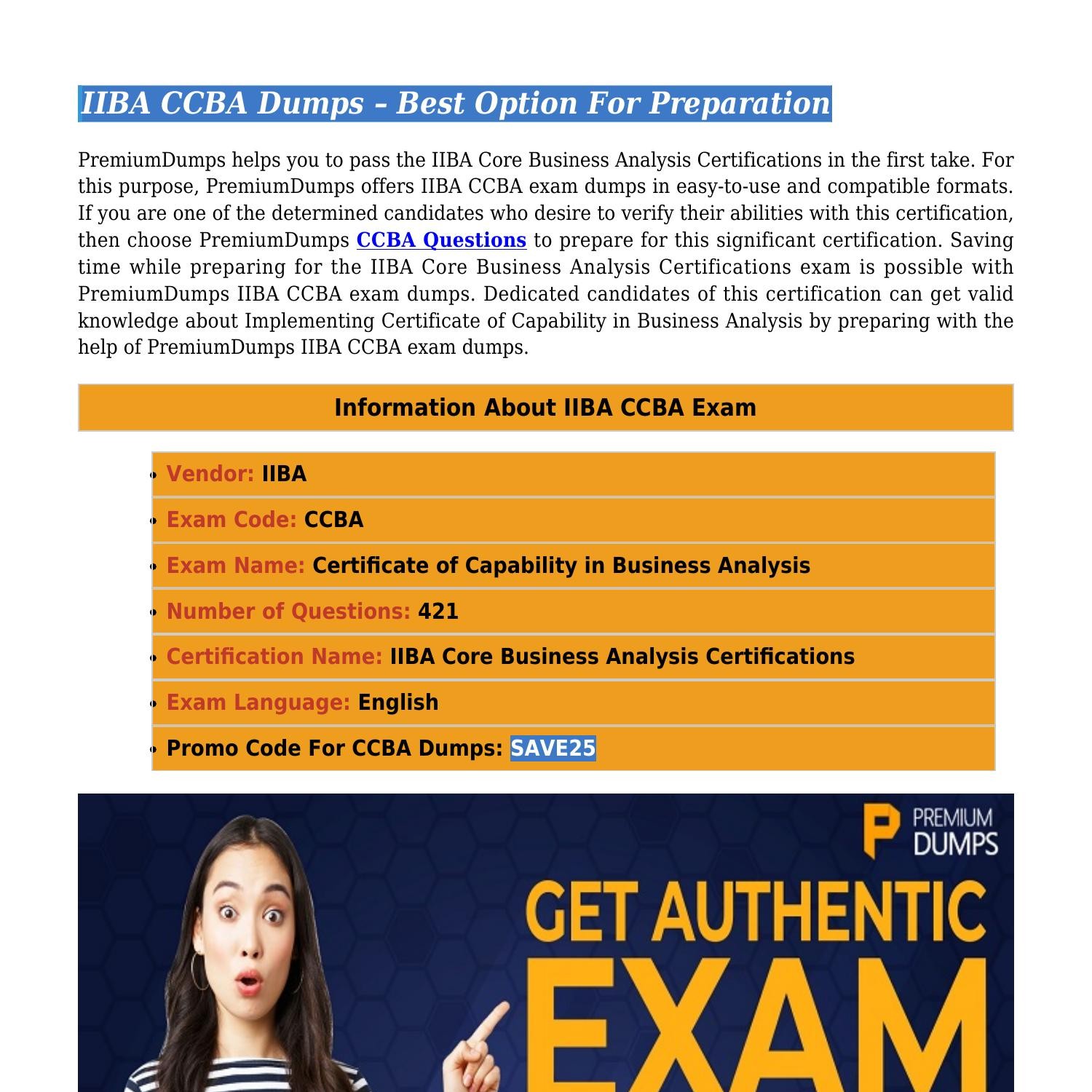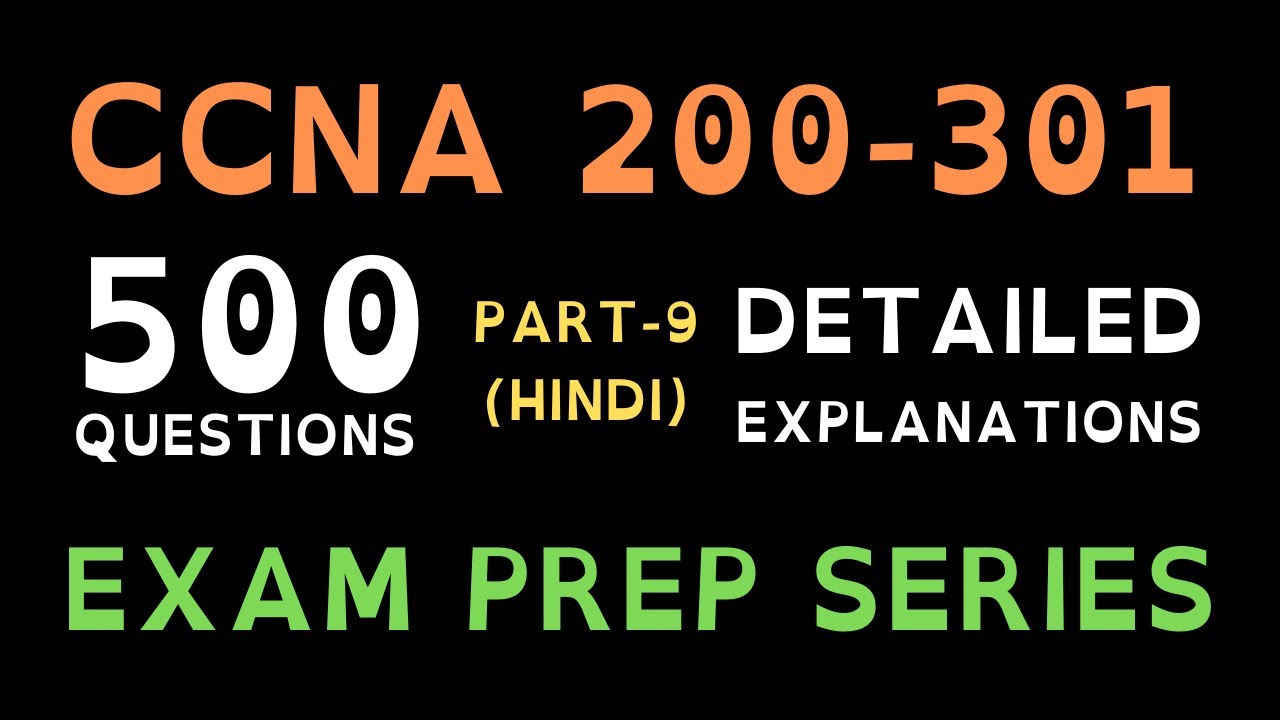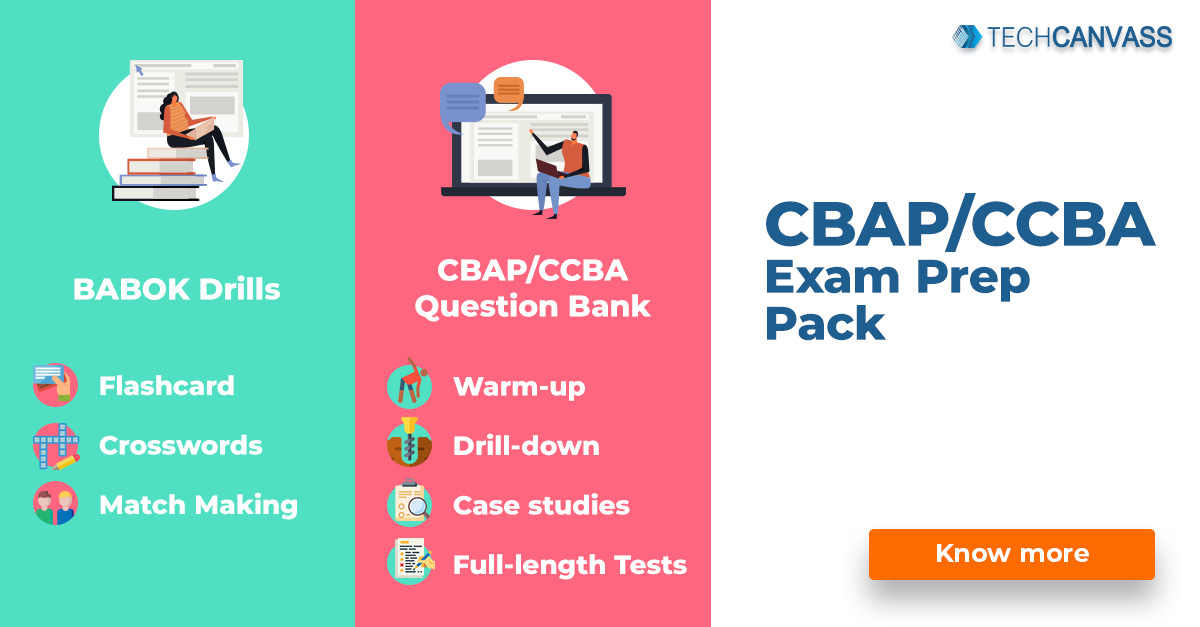CCBA Exam preparation – Embark on a comprehensive journey towards CCBA exam success! This guide will equip you with the essential knowledge, study strategies, and expert tips to ace the Business Analysis Certification Board (BABOK) exam.
Dive into the intricacies of the exam format, domains, and knowledge areas, and discover a treasure trove of study resources tailored to your learning style.
Exam Overview: CCBA Exam Preparation

The CCBA (Certified Capability Business Analyst) exam is designed to assess your knowledge and skills in the field of business analysis. It’s a certification offered by the International Institute of Business Analysis (IIBA) and is recognized worldwide.
The exam consists of 120 multiple-choice questions and lasts for 3 hours and 30 minutes. To pass, you need to score at least 70%. The exam covers a wide range of topics, including:
Exam Format
- Requirements Elicitation and Analysis
- Solution Assessment and Validation
- Business Analysis Planning and Monitoring
- Stakeholder Engagement
- Communication and Collaboration
Domains and Knowledge Areas

The CCBA exam covers five distinct domains, each comprising specific knowledge areas that assess your proficiency in business analysis concepts and practices.
Business Analysis Planning and Monitoring
- Planning and managing the business analysis initiative
- Monitoring and controlling the business analysis initiative
Elicitation and Collaboration
- Eliciting requirements from stakeholders
- Facilitating communication and collaboration among stakeholders
Requirements Analysis and Design Definition
- Analyzing and modeling requirements
- Defining and specifying requirements
Solution Evaluation and Validation
- Evaluating potential solutions
- Validating the solution against requirements
Business Analysis Communication and Delivery, CCBA Exam preparation
- Communicating business analysis information
- Delivering business analysis deliverables
Study Resources

Preparing for the CCBA exam requires a comprehensive approach that incorporates various study materials. Each type of resource caters to different learning styles and provides unique benefits. Understanding the strengths and limitations of each resource is crucial for maximizing your study effectiveness.
Books
Books offer a comprehensive and in-depth exploration of the CCBA exam topics. They provide structured content, allowing you to progress through the material at your own pace. Some recommended books include:
- CBAP/CCBA Certified Business Analysis Study Guide by Susan Weese
- Business Analysis for Practitioners: A Practice Guide by IIBA
- CBAP/CCBA Exam Prep Book by IIBA
Benefits:
- Comprehensive coverage of the exam topics
- Structured learning experience
- Reference for future use
Limitations:
- Can be time-consuming to read through
- May not be interactive or engaging for all learners
- Can be expensive
Case Studies
Case studies are indispensable tools for exam preparation as they provide real-world scenarios that test your understanding of the material. They simulate the challenges you may encounter in the actual exam.
Preparing for the CCBA exam? Don’t forget to brush up on User Acceptance Test (UAT). Understanding UAT will help you demonstrate your grasp of stakeholder involvement and the validation of business requirements. Nail this aspect of your CCBA exam preparation and boost your chances of success.
To effectively analyze case studies, identify key concepts and develop solutions, follow these steps:
Identifying Key Concepts
- Read the case study carefully, highlighting important information.
- Identify the problem or challenge being presented.
- Break down the case study into smaller components and identify the relevant CCBA domains and knowledge areas.
Developing Solutions
- Apply your knowledge of the material to develop potential solutions.
- Consider the pros and cons of each solution.
- Choose the best solution and explain your reasoning.
Writing Case Study Responses
- Demonstrate a deep understanding of the material by using specific examples and references to the CCBA curriculum.
- Be concise and organized in your response.
- Proofread your response carefully before submitting it.
Mind Mapping
Mind mapping is a powerful technique for organizing and visualizing information. It can help you to understand complex concepts, remember information more easily, and prepare for exams more effectively.
Mind maps are created by starting with a central topic and then branching out to related ideas. You can use colors, images, and symbols to make your mind maps more visually appealing and easier to remember.
Benefits of Mind Mapping for Exam Preparation
There are many benefits to using mind maps for exam preparation, including:
– Improved organization and clarity: Mind maps can help you to organize your thoughts and ideas in a clear and logical way. This can make it easier to understand complex concepts and to remember information more easily.
– Enhanced memory and understanding: Mind maps can help you to improve your memory and understanding of the material you are studying. By visually representing the relationships between different concepts, mind maps can help you to see the big picture and to make connections between different pieces of information.
– Reduced study time: Mind maps can help you to reduce your study time by making it easier to focus on the most important information. By identifying the key concepts and s, mind maps can help you to target your studying and to avoid wasting time on irrelevant information.
– Increased confidence: Mind maps can help you to increase your confidence in your ability to succeed on your exam. By providing a clear and organized overview of the material, mind maps can help you to feel more prepared and confident on test day.
Steps for Creating a Mind Map
To create a mind map, follow these steps:
1. Start with a central topic.
2. Branch out to related ideas.
3. Use colors, images, and symbols to make your mind map more visually appealing.
4. Review your mind map regularly.
Collaboration and Study Groups

Collaboration and study groups can be incredibly beneficial for CCBA exam preparation. Joining forces with peers allows you to share knowledge, support each other, and stay motivated. It’s like having a squad of CCBA warriors by your side, ready to conquer the exam together.
Finding Study Partners
Finding study partners can be as easy as hitting up your fellow CCBA aspirants on LinkedIn or reaching out to colleagues who are also preparing for the exam. You can also join online forums and discussion groups dedicated to CCBA preparation.
Creating Effective Study Sessions
To make the most of your study sessions, establish clear goals and a structured schedule. Divide the study material into manageable chunks and allocate specific time slots for each topic. Make sure to take breaks and reward yourselves for your hard work.
Stress Management

Exam preparation can be a stressful experience. Managing stress is crucial for maintaining focus, staying motivated, and performing well on the CCBA exam. Techniques like mindfulness, exercise, and sleep hygiene can help reduce anxiety and improve cognitive function.
In the realm of CCBA Exam preparation, the ability to meticulously uncover requirements is paramount. Delve into the intricacies of Requirements Discovery for Business Analyst , a crucial skill that enables you to bridge the gap between stakeholders’ needs and tangible solutions.
By mastering this art, you’ll equip yourself to navigate the complexities of the CCBA Exam with finesse.
Anxiety Reduction
- Practice mindfulness techniques like meditation or deep breathing exercises to calm the mind and reduce anxiety.
- Engage in regular physical activity, as exercise releases endorphins that have mood-boosting effects.
- Get enough sleep, as sleep deprivation can exacerbate stress levels and impair cognitive abilities.
Staying Motivated
- Set realistic goals and break down large tasks into smaller, manageable chunks to avoid feeling overwhelmed.
- Reward yourself for completing tasks, no matter how small, to maintain motivation.
- Connect with a study group or mentor for support and accountability.
Maintaining Focus
- Create a dedicated study space free from distractions to improve focus.
- Use study techniques like the Pomodoro Technique to alternate between focused study sessions and short breaks.
- Take regular breaks to clear your mind and prevent burnout.
Exam Day Strategies

The day of the exam is finally here, and you want to make sure you’re prepared to give it your best shot. Here are some tips to help you make the most of exam day:
Get a Good Night’s Sleep
This may seem like a no-brainer, but it’s important to get a good night’s sleep before the exam. When you’re well-rested, you’ll be able to focus better and perform at your peak.
Eat a Healthy Breakfast
Don’t skip breakfast on exam day. Eating a healthy breakfast will give you the energy you need to power through the exam.
Arrive Early
Give yourself plenty of time to get to the exam room on time. This will help you relax and avoid any unnecessary stress.
Manage Your Time
One of the most important things you can do on exam day is to manage your time wisely. Create a study schedule that allows you to review all of the material and practice answering questions.
Get ready to conquer the CCBA Exam with our expert guidance. And if you’re aiming higher, don’t miss our exclusive tips for the CBAP Exam preparation . By following our proven strategies, you’ll master the intricacies of both exams and unlock your potential as a certified business analyst.
Answer Questions Effectively
When answering questions, read the questions carefully and understand the question types. Use s to help you identify the main points of the question.
Handle Unexpected Situations
There’s always a chance that you’ll encounter an unexpected situation on exam day, such as technical difficulties or a difficult question. Stay calm and focus on the task at hand.
Exam Day Strategies and Tips
| Strategy | Tip |
|---|---|
| Get a Good Night’s Sleep | Go to bed early and get at least 8 hours of sleep. |
| Eat a Healthy Breakfast | Eat a breakfast that is high in protein and fiber to give you sustained energy. |
| Arrive Early | Give yourself plenty of time to get to the exam room and settle in. |
| Manage Your Time | Create a study schedule and stick to it. |
| Answer Questions Effectively | Read the questions carefully and understand the question types. |
| Handle Unexpected Situations | Stay calm and focus on the task at hand. |
Common Exam Day Mistakes to Avoid
- Not getting enough sleep
- Skipping breakfast
- Arriving late
- Not managing your time wisely
- Answering questions without reading them carefully
- Panicking if you encounter an unexpected situation
Stay Calm and Confident
It’s important to stay calm and confident on exam day. If you start to feel stressed, take a few deep breaths and remind yourself that you’ve prepared for this.
The CCBA Exam is a challenging but rewarding endeavor. To ace it, you’ll need a solid foundation in Business Analysis Fundamentals. Check out this comprehensive guide to Business Analysis Fundamentals – ECBA, CCBA, CBAP to get a head start on your CCBA Exam preparation.
With the right knowledge and preparation, you’ll be well-equipped to conquer this exam and advance your career in business analysis.
“The best way to prepare for an exam is to be confident in your abilities and to stay calm under pressure.” – Unknown
Manage Stress and Anxiety
If you’re feeling stressed or anxious on exam day, there are a few things you can do to manage your stress levels:
- Practice relaxation techniques, such as deep breathing or meditation.
- Talk to a friend or family member about your feelings.
- Get some exercise to help reduce stress.
- Eat healthy foods and get plenty of sleep.
- Use positive self-talk and visualization techniques to boost your confidence.
Post-Exam Analysis
Ace-ing the CCBA exam is no walk in the park. But fret not, exam warriors! Post-exam analysis is your secret weapon to slay future attempts. It’s like a post-battle debrief, helping you pinpoint your strengths, weaknesses, and devise a cunning plan for exam domination.
Interpreting Scores
Your score report is a treasure map, revealing your strengths and weaknesses. Here’s a handy table to decode the score ranges and their implications:
| Score Range | Interpretation | Strengths | Weaknesses |
|---|---|---|---|
| 80-100% | Exceptional | Strong understanding of all domains | None |
| 65-79% | Proficient | Solid understanding of most domains | Specific areas for improvement |
| 50-64% | Needs Improvement | Adequate understanding of some domains | Significant gaps in knowledge |
| Below 50% | Significant Improvement Required | Limited understanding of most domains | Major gaps in knowledge |
Planning for Future Attempts
Based on your score, you’re ready to chart a course for exam victory. Here’s a flowchart to guide you:
- 80% or higher: You’re a CCBA rockstar! Maintain your knowledge and stay sharp.
- 65-79%: Identify specific areas for improvement and focus on strengthening them.
- 50-64%: Revise all domains thoroughly and seek additional resources to fill knowledge gaps.
- Below 50%: Consider retaking the exam after a comprehensive review of all domains.
Common Pitfalls
Avoid these traps when reviewing your results and planning for future attempts:
- Ignoring your weaknesses: Don’t let your strengths overshadow your areas for improvement.
- Overconfidence: Don’t assume you know everything after a high score. There’s always room for growth.
- Discouragement: A low score doesn’t mean you’re a failure. Use it as fuel to improve.
Final Summary

Remember, the CCBA exam is not just a test; it’s a testament to your mastery of business analysis principles. With dedication, strategic preparation, and unwavering confidence, you will emerge victorious, ready to elevate your career to new heights.
Popular Questions
What is the passing score for the CCBA exam?
The passing score for the CCBA exam is 70%.
How long is the CCBA exam?
The CCBA exam is 3 hours and 15 minutes long.
How many questions are on the CCBA exam?
There are 150 questions on the CCBA exam.
What is the best way to prepare for the CCBA exam?
The best way to prepare for the CCBA exam is to study the BABOK Guide and take practice exams.


